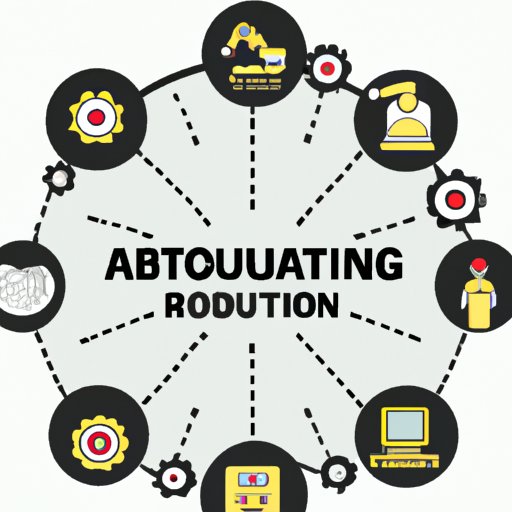Introduction
Automation is a term that is used to refer to the process of using technology to perform certain tasks or processes without human intervention. This can include anything from robotic assembly lines to artificial intelligence-powered customer service chatbots. Automation has become increasingly popular in recent years due to its ability to improve efficiency and reduce costs. In this article, we will explore how automation works, the various types of automation systems, and the benefits and risks associated with automating processes.

Definition of Automation and Explanation of How it Works
At its core, automation is the use of technology to automate tasks or processes. This means that instead of having to manually input data or execute a process, automation allows for these tasks to be completed automatically. Automation can involve anything from simple scripts and macros to complex robotics and artificial intelligence. Depending on the complexity of the task, automation can be used to increase speed, accuracy, and efficiency.
The most common type of automation is known as “programmable automation”. This involves programming a computer or robot to carry out specific tasks or processes. For example, a manufacturing facility might use programmable automation to control the production line, while a retail store might use programmable automation to manage inventory and pricing. Other types of automation include “adaptive automation”, which uses sensors and feedback loops to make decisions; “intelligent automation”, which uses artificial intelligence to complete tasks; and “autonomous automation”, which is a fully autonomous system that can operate without human intervention.

Benefits and Risks of Automating Processes
Automation can have both positive and negative impacts on businesses and societies. On the one hand, automation can lead to increased efficiency and cost savings. Automated processes are typically faster and more accurate than manual processes, and they can free up time for employees to focus on more important tasks. Automation can also reduce errors and eliminate the need for manual labor, which can help to reduce operational costs.
On the other hand, automation can lead to job losses and a lack of flexibility in processes. Automation can also lead to unexpected consequences, such as the disruption of existing markets or the emergence of new competitors. Finally, automation can lead to security and privacy concerns, as automated systems may be vulnerable to hacking or other malicious activities.
Use Cases of Automation in Specific Industries
Automation can be applied to virtually any industry, but there are some areas where it is particularly effective. In the manufacturing industry, automation can be used to streamline production processes, reduce waste, and improve quality control. In healthcare, automation can be used to automate administrative tasks, such as patient scheduling and billing, as well as provide more accurate diagnoses and treatments.
In the retail industry, automation can be used to optimize inventory management and improve customer service. Automation can also be used to personalize the shopping experience for customers, by providing personalized product recommendations or discounts. Finally, automation can be used in the financial services industry to automate investment decisions, trading activities, and fraud detection.
Impact of Automation on Jobs and Businesses
The impact of automation on jobs and businesses varies depending on the industry and the types of jobs being automated. In some cases, automation can lead to job losses, as robots and other automated systems can replace human workers in many roles. However, automation can also create new jobs, such as those related to the development and maintenance of automated systems.
From a business perspective, automation can lead to increased efficiency and cost savings. Automation can also enable businesses to scale rapidly, as automated processes are typically faster and more efficient than manual processes. Additionally, automation can help businesses stay competitive in an increasingly digital landscape.

Future of Automation and its Impact on Society
The future of automation is difficult to predict, but it is likely that automation will continue to play an increasingly important role in our lives. Automation will likely lead to increased efficiency and cost savings, as well as new opportunities for businesses. However, automation will also pose challenges, such as job displacement, income inequality, and privacy concerns.
As automation becomes more pervasive, it will be important to ensure that its benefits are shared equitably and responsibly. Governments, businesses, and individuals must work together to ensure that automation is used to create a better future for all.
Conclusion
Automation is an increasingly important part of modern life, and it has the potential to bring about significant changes in the way we live and work. Automation can help to improve efficiency and reduce costs, but it can also lead to job losses and other unintended consequences. It is important to understand the benefits and risks of automation in order to ensure that its use is responsible and equitable.
The future of automation is uncertain, but it is likely that automation will continue to play an important role in our lives. Governments, businesses, and individuals must work together to ensure that the potential benefits of automation are realized, while also addressing the potential challenges posed by automation.
(Note: Is this article not meeting your expectations? Do you have knowledge or insights to share? Unlock new opportunities and expand your reach by joining our authors team. Click Registration to join us and share your expertise with our readers.)
